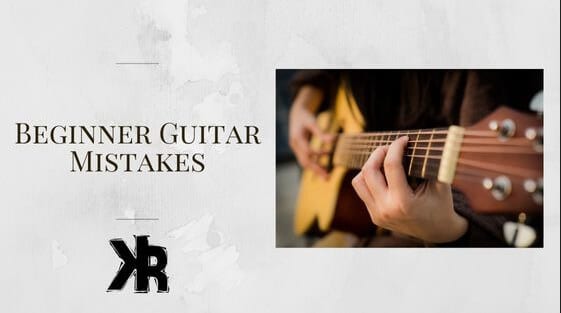Table of Contents
I’m a guitar player and enthusiast. Therefore, I understand the value of starting out by avoiding frequently made beginner guitar mistakes. The purpose of this tutorial is to first make you aware of them.
Then, give you comprehensive instructions on how to prevent them. Your playing technique will be improved, and you’ll be able to advance your abilities. Ready to get started?
1. Holding the Guitar Incorrectly
One of the most common mistakes people make is holding the guitar wrong. It’s crucial to have a good posture while playing.
First for comfort, but also to prevent needless strain and injuries. Your guitar should be held in a way that is almost effortless.
This will become obvious when it’s positioned correctly. The neck of the guitar should be angled slightly upward. The instrument shouldn’t ever need to be held by the neck. If you do, you won’t be able to fret or change chords quickly enough.
It should sit in your lap and be supported under the arm of your strumming hand. You can also try placing it on the opposite leg. This has the added benefit of stabilizing the guitar using only your legs. It’s the way I play the guitar almost every time.
2. Failing to Warm Up
Failing to warm up before playing is another important one. So important that it made position 2 on our list! Warming up is essential to prevent injuries and prepare your fingers for playing.
It’s recommended to start with simple exercises that gradually increase in difficulty. This will help to warm up your fingers and improve your playing technique.
Simple exercises like running up and down the frets on each string. You just need to be moving your muscles and loosening up. Even five minutes can make a world of difference.
3. Forgetting to Tune Your Guitar
Tuning the guitar is essential to producing a good sound quality. Neglecting to tune up can result in an incorrect sound. It’s not pleasing to the ear.
But an out of tune guitar will also make you think that the technique is wrong. And guitars can go out of tune for many reasons.
Like you are making mistakes because it sounds bad. So it’s recommended that the guitar be tuned before each playing session. Make sure you have a quality tuner and don’t forget to use it! Even if it means having to use a sticky note.
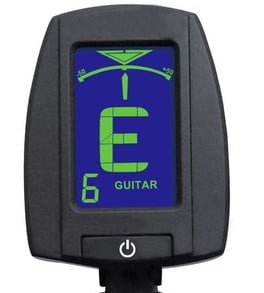
4. Playing with too Much Muscle Tension
I get it, placing your fingers on the frets is not easy! But, playing guitar with too much tension can result in strain to the hands and fingers. It’s important to play relaxed, with a loose hand. Try to avoid gripping the neck too tightly.
A lack of calluses on your fingers creates a buzz when you play. This is normal. As beginners, we have a tendency to want to clamp tightly to make it sound right. But this leads to bad habits.
So for the first little while, just accept the fact that there is some buzz. It’s not going to sound perfect for a few weeks yet.
But it will come, and when it does, you won’t have the bad habit of clamping down on the strings.
5. Tilting or Twisting the Guitar
While it might be inconvenient to not see the fretboard, this is something you must get used to.
Twisting or tilting the guitar to be able to better see the fretboard is a mistake. This is because it changes the angle of the board, putting stress on your wrist.
Most guitars have indicators on the top of the fretboard. These are used to help you see which fret you are playing. Use these instead of trying to get a better viewing angle. The guitar is made to be played this way. You will eventually get used to it, just give it time.
6. Playing too Fast
Another error guitarists make when they first start out is playing too quickly. The thought of being able to keep up with your favorite music is tempting. And one day, you will play them just like the record!
But for now, it’s important to concentrate on playing precisely. Sometimes this means slowing down to a crawl. Playing too quickly might result in errors. This will impede your ability to improve as a guitarist.
7. Not Using a Metronome
Timing is crucial in music! Using a metronome can help to improve your sense of rhythm. And as a guitar player, this is more important than most people think. Many guitarists make the mistake of not using a metronome while practicing.
This can lead to poor timing and sloppy playing. Let’s face it, not everyone has great timing musically. Incorporating a metronome into your practice routine can help to improve your timing! And overall, your playing technique as well.
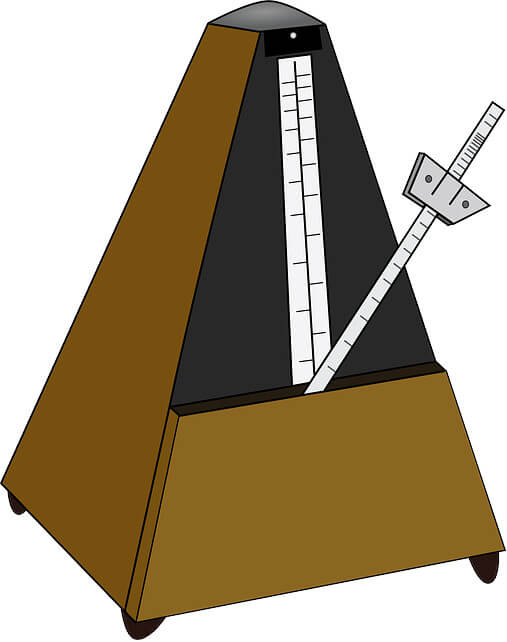
8. Not Practicing Consistently
Consistent practice is key to improving as a guitarist! Yet, many beginners make the mistake of not practicing regularly. It’s better to rehearse for shorter periods each day. Instead of cramming it all in once a week.
Set aside a specific time each day for practice. Even if it’s just for 15 or 30 minutes. Use this time to work on specific techniques, scales, or songs that you want to learn.
Create a plan for yourself! It’s also important to track your progress and set goals. This way you will see how far you’ve come and remain motivated to continue.
9. Not Learning the Fretboard
Another common mistake is not taking the time to learn the fretboard. Knowing the notes on the fretboard is essential for a guitarist!
It helps to understand the chords, scales, and music theory that is not otherwise possible. It also allows you to play in different positions on the neck.
One way to learn the fretboard is to memorize the notes on each string. Starting with the open strings and then moving up the fretboard.
You can also use mnemonic devices to help remember the order of the notes. A popular one is “Eddie Ate Dynamite Good Bye Eddie” for the open strings. This goes from lowest to highest.
Another way to learn the fretboard is to practice playing scales and arpeggios. Do this in different positions on the neck, using a combination of memorization and muscle memory.
There are a tonne of internet tools and smartphone apps that may be used to study the fretboard as well.
10. Failing to Learn Music Theory
It is possible to play the guitar without having a thorough understanding of music theory. But doing so can substantially improve your playing and overall proficiency!
Learning the theory will make it easier for you to improvise more skillfully. It will also help to comprehend the fundamental structure of music. Interacting with other musicians will be easier too.
To avoid this mistake, consider taking music theory classes. Or study online resources to learn the fundamentals of music theory. Practice applying your knowledge by analyzing different songs. Identify their chord progressions and key changes.
11. Starting Out with Poor Quality Equipment
Not everyone has a large budget to buy the best equipment. This will mean that in some circumstances, cheaper guitars must be purchased.
Some people buy used, which is fine. But be very careful not to just buy the first really cheap guitar you find.
If your equipment is very poor quality, learning will be much harder! There are many affordable options that can provide a great experience.
If you are not sure, then consult with someone who can help. Maybe this is a teacher or even a friend who knows a bit about the guitar. This way you get equipment that will actually help you succeed!
12. Not Maintaining the Guitar
The guitar needs to be maintained regularly to stay in a playable condition. A buildup of dirt and grime can degrade the sound of a guitar.
This can happen if the strings, fretboard, and body are neglected and aren’t cleaned.
To keep the guitar in top shape, I suggested cleaning it after each playing session. You will also want to have a professional service it occasionally. Just to make sure the action and playability are good enough.
13. Avoiding Sufficient Rest
Practicing regularly is essential for improving guitar skills! But it’s also important to get sufficient rest.
Pushing yourself too hard and practicing for long hours without taking adequate breaks can lead to burn out and fatigue. This can have a negative impact on your playing.
To avoid burnout and fatigue, make sure to take breaks during your practice sessions. You can use this time to stretch, hydrate, or simply take a short walk to clear your mind.
Additionally, it’s ok to give your fingers the day off. If your tips hurt too badly, don’t worry if you need to take the time off. You can start again tomorrow.
14. Strumming too Hard or Soft
Strumming the guitar too hard or soft can result in a poor sound quality. A very hard Strum can cause a distorted, unpleasant sound.
Yes, you can over exert the vibration of the strings. Some people even injure their fingers!
On the other hand, strumming too softly can result in a muted, weak sound that lacks energy. Striking the right balance between the two can produce a pleasant, full-bodied sound. Work on finding where that is and execute it regularly.
15. Relying too Heavily on Tabs
Tabs can be a useful tool for learning new songs and techniques. But relying too heavily on them can hinder your abilities. Things like reading sheet music, improvisation, and developing your ear training skills.
To avoid this mistake, try to balance your use of tabs with other learning methods. Set aside time to learn to read sheet music.
Practice by ear, getting acquainted to the sound of notes. And learning music theory! Additionally, try to challenge yourself by transcribing songs and solos by ear. A great program for this is made by Seventh String called Transcribe!
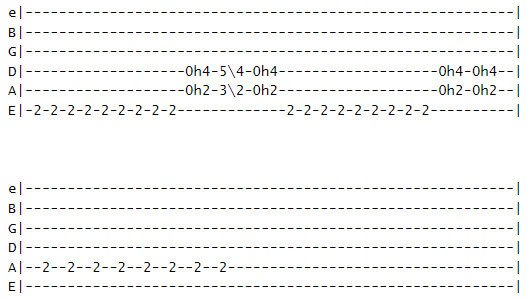
16. Neglecting Ear Training
And that leads us into the importance of ear training! This is an essential aspect of developing guitar skills. It involves learning to recognize different chords, scales, and notes by ear.
You will develop a stronger sense of pitch and improve your improvisation skills. Overall, enhancing your musicianship and ability to write music.
To improve these skills, practice listening to different chord progressions and scales. Try to identify them by ear. Listen to notes and memorize them. Over time, you will begin to recognize them by ear. As you do, playing songs by listening to them will become easier!
17. Trying to Learn too Much at Once
It’s easy to get option paralysis when learning. There are many things that you can learn on the guitar. It’s a very dynamic and versatile instrument.
But it can be very overwhelming when getting started. Many players make the mistake of taking on too much at once.
As a result, burn out sets in and you never really master one thing. This can lead to loss of motivation and eventually just quitting.
So make sure that you don’t bite off more than you can chew! Create a plan and stick to it. Work on just a few things at a time. Master them before moving on. This way you stay motivated and see results!
18. Incorrect Finger Placement
In the early stages, new players don’t quite understand how the frets work. As a result, they tend to press down directly on top of them. This results in fret buzz and a lack of sustain. Notes will die off rather quickly this way. Plus, they just don’t sound right at all!
The purpose of a fret is to shorten the string length. So when pressing down, make sure your finger is directly behind the fret.
This will then allow the string length to be shortened and the note ring out. So if you’re pressing down on top of the fret, it’s a simple mistake to correct!
19. Not Working on Picking Technique
Another common mistake that beginner guitarists make is not working on their picking technique. Picking is a crucial part of playing the guitar!
It can make a big difference in the overall sound of your playing. If you neglect your picking technique, your ability will eventually plateau.
It’s essential to practice your picking technique as part of your plan. Some tips for improving your technique include working on alternate picking.
Being able to quickly pick up and down will increase speed. Make sure to also have the right picks for your style! Unless, of course, you play without one!
20. Comparing Your Progress to Others
It’s natural to want to see progress in your playing and to compare yourself to others. But this can be discouraging and counterproductive! Everyone learns at their own pace, and progress is not always linear.
Comparing yourself to others can make you feel like you’re not making good progress. In the end, this can lead to frustration and ultimately make you want to give up.
It’s essential to remember that everyone starts at a different level. We all have different strengths and weaknesses.
Try not to compare yourself to others. Focus on your own progress and celebrate your small victories along the way. After all, this is supposed to be fun!
21. Not Experimenting with Tone and Effects
Experimenting with different tones and effects can help you progress as well. A mistake beginners make is neglecting to try different sounds.
The guitar is a versatile instrument that can produce a wide range of sounds. Trying different tones and effects can help you find your own sound and style.
Different types of pickups, amplifiers, pedals, and effects can help you understand variations in sound. It can also help you discover if what you have is any good or not. When your budget allows, play around with new gear.
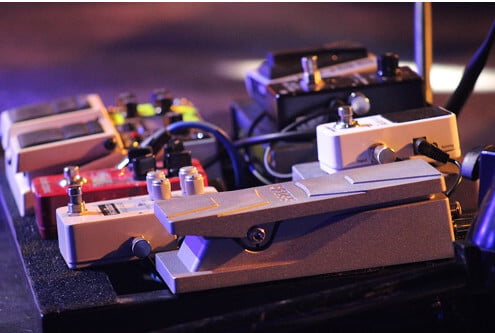
22. Focusing Too Much on Technical Ability
Your technical ability is important. But focusing too much on it can lead to neglecting other important aspects of playing the guitar.
For example, neglecting musicality, expression, and creativity. This can result in a technically proficient but emotionally flat performance.
Make sure to concentrate on every area of playing the guitar to avoid making this mistake. This encompasses originality, expression, and musicality.
Try out multiple techniques, rhythms, and chord progressions. Constantly strive to improve your playing technique and repertoire.
23. Forgetting to Have Fun
Last but not least, the biggest mistake that any guitarist can make is not having fun! Playing the guitar should be an enjoyable and fulfilling experience. If you’re not having fun, then something is missing.
Take time to play the music that you love. Whether it’s learning your favorite songs, jamming with friends, or writing your own music.
Remember why you started playing in the first place! As you continue to develop as a guitarist and learn new things, keep that flame alive.

